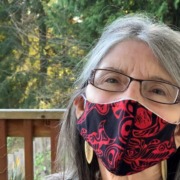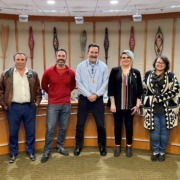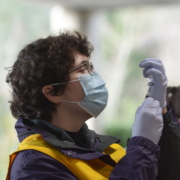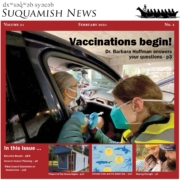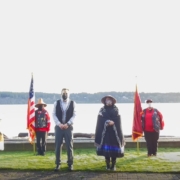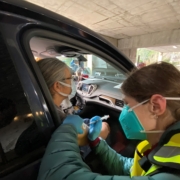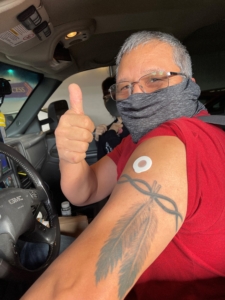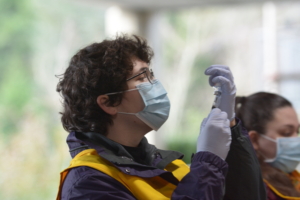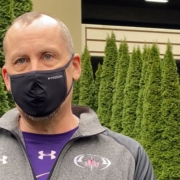SUQUAMISH, WA — The Suquamish Tribe will soon begin vaccinating essential staff and teachers at North Kitsap public schools under an agreement announced today.
Teachers and other staff will begin receiving the vaccinations on March 10th at the drive-thru clinic the Tribe set up in early January to vaccinate Tribal Elders and families, and the staff of the Tribal government and the Tribe’s business enterprises. The Tribe will vaccinate an estimated 600 of the School District’s 950 staff, including all who opt-in for the two-shot series. Vaccinating the teachers and other staff of the North Kitsap School District is the most ambitious expansion of the Suquamish Tribe’s vaccination program to date.
“Suquamish has a tradition of hospitality, and that extends to our commitment to the health of all that live around us,” said Suquamish Chairman Leonard Forsman. “Having vaccinated the majority of our Tribal citizens and their families, and government and enterprise employees, we expanded to offer shots to essential Kitsap 9-1-1 dispatch staff and to other American Indians living in Kitsap County who are not Suquamish Tribal members.”
“And today, we’re announcing a joint project with the North Kitsap School District to vaccinate teachers and staff, assuring that our community’s schools can reopen safely.”
When the North Kitsap School District staff learned of the news during a Zoom call this morning “the response was overwhelming,” according to Jenn Markaryan, North Kitsap School District Communications Coordinator. “Hands raised up in gratitude, and a system-wide sense of relief to have a definitive pathway to vaccination.”
“The Governor’s announcement yesterday was met with excitement, but left folks nervous because appointment availability is scarce,” she added. “It is truly a great day.”
Dr. Laurynn Evans, superintendent of the North Kitsap School District, said: “I want to express my deepest thanks to the Suquamish Tribe. I am grateful to the Tribe for providing this opportunity for NKSD employees, and I appreciate their ongoing partnership with NKSD to support our students, our staff, and our greater school community.”
Further extending its commitment to the community, the Tribe also plans to vaccinate residents of the Cedar Glen Mobile Home Park located on Highway 305, on the Port Madison Indian Reservation. Most of the residents are elderly and many have mobility issues that prevent them from accessing the COVID-19 vaccine.
Northwest Tribes have a long and devastating experience with pandemics. According to historian Robert Boyd, an estimated 30 percent of the Northwest Coast native population died from smallpox in the 1770s at a time when the Tribes were first in contact with European explorers. By the time settlers arrived in the 1850s, waves of measles, influenza, and additional outbreaks of smallpox had devastated tribal communities, reducing populations to an estimated quarter of their previous size.
Today’s COVID-19 pandemic has also been devastating to Tribal communities, with a mortality rate nationwide among Native Americans and Alaska Natives that is nearly twice the rate of non-Hispanic White people, according to a study published by the Centers for Disease Control and Prevention.
The Suquamish Tribe took precautions early on, activating its Emergency Operations Center in March 2020. Tribal government offices were closed to the public, and staff worked from home or went on furloughs. These early actions helped the Tribal community and its employees to escape some of the worst of the pandemic impacts.
Since the beginning of the pandemic, Tribal community health nurses have offered COVID-19 testing to the Tribal community and its employees on-demand and conducted contact tracing when a positive test has been received. The Tribe’s nurses also offer drive-thru flu vaccinations to avert the possibility of multiple illnesses spreading through the community.
The Suquamish Clearwater Casino Resort was completely closed for nine weeks, until high-tech screening and COVID safety protocols could be put in place. The Casino Resort has since reopened with limited capacity, shorter hours, and thorough screening and safety protocols.
Beginning in early January 2021 — led by emergency managers, drawing on the expertise of Tribal police and with the help of staff from Tribal government and enterprises — the Tribe turned a floor of the Clearwater Casino parking garage into a drive-thru clinic, and mass vaccination began as soon as supplies of the Moderna vaccines became available.
First to be vaccinated were Tribal Elders, health care staff, and a handful of essential government workers. Tribal members and their families followed quickly, along with the staffs of the Tribal government and the Tribe’s business enterprises.
As of March 2, 2021, Suquamish Tribe Health nurses have administered 1,976 first doses, 1,247 second doses; for a combined total of 3,174 Moderna COVID-19 vaccine doses. In addition to the doses administered to Suquamish Tribal households, this number includes:
- 288 of the Tribal government’s 385 employees, for a total of 75 percent of employees.
- 75 non-Suquamish Native American household members living within Kitsap County.
- 29 Kitsap 911 dispatchers and essential support staff.
As of the end of February, 73 percent of the Port Madison Enterprise’s 737 employees had been fully vaccinated; 82 percent have had one of the two-shot series.
In spite of the large numbers who have been vaccinated, Tribal government and business enterprise staff continue to wear masks and practice COVID safety protocols, while COVID-19 testing continues. The Emergency Management Office staff and Tribal leaders continue to monitor the situation as new developments arise with time.
All of these precautions have been costly to normal operation of businesses and government, and enormously time-consuming, and the precautions have forced the cancellation of cultural practices that are foundational to the Tribe’s way of life.
Nevertheless, taking aggressive, science-based action has helped keep the Tribal community, and those in surrounding the community, safer. Vaccinating the teachers and staff at North Kitsap Schools is a major additional step towards safeguarding the health of all residents of the larger community.
“Vaccinating the teachers and staff at the North Kitsap School District brings the area closer to the day when schools can fully reopen, which is an important first step in recovery for the whole community,” Forsman noted.


